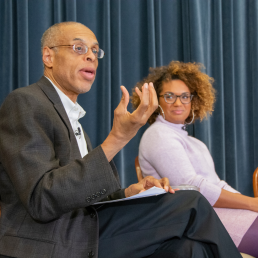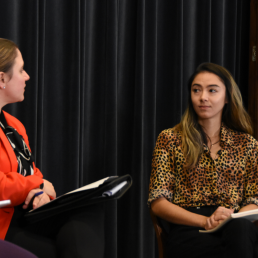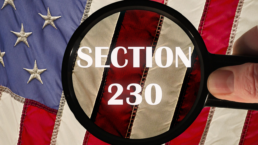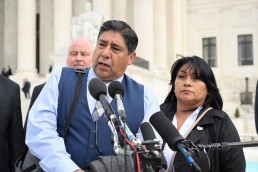Warhol v Goldsmith: Supreme Court Upholds that Every Artist Matters, Photographer Goldsmith Protected Warhol Case
Every Artist Matters: The Supreme Court Protects Photographer Goldsmith in the Warhol Litigation
The Supreme Court decided today that the late Andy Warhol infringed upon the rights of photographer Lynn Goldsmith when he used her photograph of music legend Prince to create a silkscreen rendering of the late artist. The Court agreed with Goldsmith that Warhol’s use was not permitted under the copyright doctrine of Fair Use, which allows the use of a copyrighted work without the creator’s permission under certain circumstances.
“Today’s decision ensures the vitality of the Fair Use doctrine while protecting artists, particularly marginalized and developing artists, from the distortion of the doctrine into a tool for the misappropriation of one artist’s work by another artist with greater fame and public recognition,” said Lateef Mtima, Director of the Institute for Intellectual Property and Social Justice. “Elite patrons of the arts often gravitate to the work of famous artists, and in many situations are ignorant of the predecessor works produced by marginalized and lesser-known artists and which have been unfairly misappropriated by artists of renown. The Institute filed an amicus brief in support of photographer Goldsmith to support the proper application of the Fair Use doctrine as a critical tool to promote learning through and creative building upon artistic and literary achievement, while respecting the legitimate ownerships rights and artistic interests of creators in their work.”
The Supreme Court’s decision can be found here.
The Institute for Intellectual Property and Social Justice works to promote social justice in the field of intellectual property law and practice, both domestically and globally. Advocating for core principles of socially equitable access, inclusion, and empowerment throughout the IP ecosystem, IIPSJ’s work ranges broadly and includes scholarly examination of IP law from a social justice perspective; advocacy for social justice cognizance in the shaping and implementation of IP legislation and policy; initiatives to increase the diversity of the IP bar; and programs which promote greater awareness and understanding of IP protection, particularly among historically and currently disadvantaged and underserved groups, to empower them to exploit intellectual property effectively.
Gonzalez v Google: Supreme Court Preserves Section 230, Empowers Marginalized Voices
The Empowerment of Marginalized Voices by Section 230 Preserved by the Supreme Court
Today the Supreme Court declined to disrupt the framework through which Section 230 of the Communications Decency Act promotes access to knowledge and free speech through the Internet. Finding that the plaintiffs’ complaint appears insufficient to provide a basis for their substantive claims, the Court refrained from analyzing the possible application of Section 230’s online platform immunity provisions to such claims.
“The Supreme Court’s ruling in Gonzalez vs. Google implicitly acknowledges the complexity of the issues and interests impacted by Section 230, including the need to preserve venues through which marginalized and vulnerable voices and perspectives can be heard,” said Lateef Mtima, Director of the Institute for Intellectual Property and Social Justice. “The Amicus brief filed by the Scholars of Civil Rights and Social Justice highlighted these concerns, in an effort to aid the Court in understanding the importance of Section 230 in protecting the Internet as a marketplace for diverse and non-traditional ideas, including intellectual property achievement by marginalized creators. The Court’s decision today preserves the status quo achieved by Section 230 in balancing access to knowledge and speech interests with the goal of protecting the public from harmful and malicious conduct on the Internet.”
The Supreme Court’s decision can be found here.
The Institute for Intellectual Property and Social Justice works to promote social justice in the field of intellectual property law and practice, both domestically and globally. Advocating for core principles of socially equitable access, inclusion, and empowerment throughout the IP ecosystem, IIPSJ’s work ranges broadly and includes scholarly examination of IP law from a social justice perspective; advocacy for social justice cognizance in the shaping and implementation of IP legislation and policy; initiatives to increase the diversity of the IP bar; and programs which promote greater awareness and understanding of IP protection, particularly among historically and currently disadvantaged and underserved groups, to empower them to exploit intellectual property effectively.
IIPSJ Comments On the National Strategy for Expanding American Innovation
Diversity in IP enterprise and innovation is critical and long overdue. The need has been highlighted in the USPTO report in response to the SUCCESS Act. IIPSJ Comments on NCEAI (1)
Black Expression, Black Protests, and Black Lives
Black Expression, Black Protests, and Black Lives
A Look at What Black People Have to Lose At the Hands of the EARN IT Act
We are living history: a pandemic that has disproportionately killed Black people, the murders of Ahmaud Arbery, Breonna Taylor, and George Floyd, and the racial reckoning that soon followed. All this in the final months of a presidential election. There has never been a more important time to fight for free speech online than now.
This Administration’s position on this moment in history was made clear during the White House’s July 4th celebrations. Standing in a packed amphitheater in front of Mount Rushmore, President Trump delivered a divisive speech that described his presidential campaign as a battle against a “new far-left fascism” seeking to wipe out the nation’s values and history. He went on to describe protestors as “angry mobs...trying to tear down statues of our founders, deface our most sacred memorials and unleash a wave of violent crime in our cities.”
The President made no mention of the disproportionate impact of Covid-19 diagnoses and deaths among Black Americans or the validated fear that policies to open up communities will not be borne equally. Nor did he mention the images and videos of horrific police violence against Black Americans — especially the deeply disturbing killing of George Floyd — that went viral on platforms like Facebook, YouTube, and Twitter, sparking protests in all fifty states.
Amidst that spark, social media platforms became a tool to organize our activism, amplify our voices, and share our version of current events - a phenomenon that would have been actively impeded without Section 230. Written in 1996 by former Congressman Chris Cox (R-MN) and Congressman Ron Wyden (D-OR), Section 230 fostered free speech and innovation online by establishing that users, not the website that hosts their content, are the ones responsible for what they post online. It also gave companies the ability to limit exposure to offensive content like tweets that glorify violence without fear of being sued for bias or having their site shut down.
This past week, the Eliminating Abusive and Rampant Neglect of Interactive Technologies Act of 2020 (EARN IT Act), a law that forces online platforms to change how they moderate content online by censoring more of their users’ communications, was voted out of committee. Under the EARN IT Act, platforms would lose Section 230 protections and likely take drastic measures to mitigate their exposure. Measures that would not only limit free speech across the Internet but will disproportionately silence the voices of Black people.
It goes without saying that even with the protections of Section 230, social media companies continue to struggle with the task of content moderation. But we have to consider the strong possibility that without Section 230, sites would either limit what users can post, to avoid being sued, or stop moderating entirely. In the first scenario, content like the videos that captured the officer kneeling on George Floyd's neck and Eric Garner’s haunting final words of “I can’t breathe,” would have been blocked from social media platforms. In a world without 230, platforms might not allow posts that are critical of the Administration’s response to the pandemic because they could be interpreted as defamatory. In the second scenario, sites would choose not to moderate at all, and thus avoid responsibility for anything their users post. These sites would be breeding grounds for false, dangerous and hateful content.
In the days leading up to one of the most important elections of our lives, we cannot support any acts by Congress that will stifle our ability to power our movements and express ourselves. The EARN IT Act endangers the momentum of our activism and our ability to lift up our own narratives.
Blog Post On IIPSJ Participates in Event at Copyright Office
IIPSJ Joins Copyright Office to Discuss Social Justice and Empowering Creators of Color to Protect Their Creative Works
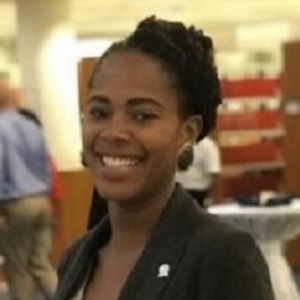
by Morgan Sills, Howard University School of Law ’21
On January 15 th the U.S. Copyright Office hosted a panel entitled “Copyright and Social Justice,” as part of its Copyright Matters series. The event explored the intersection of social justice and copyright protection, with a special focus on historically disadvantaged communities that are often unable to access protection for their work.
Opening remarks were given by Hakeem Jeffries, who is a U.S. Representative from New York and a member of the House Subcommittee on Courts, Intellectual Property, and the Internet. Representative Jeffries began the event by stressing the Constitution as the foundation of power for copyright protection and recognizing the emphasis placed on intellectual property rights by the Founding Fathers.
As the first panelist to speak, IIPSJ Founder, Professor Lateef Mtima, set the framework of the discussion by highlighting the social injustice surrounding communities that are unable to use the copyright system to protect their creations. As a result, the copyright system and structure of intellectual property rights as a whole both suffer from the exclusion of their talents and cultural contributions. IIPSJ’s Executive Director, Kim Tignor, reflected on the experiences of hip-hop groups like De La Soul and their noticeable absence from digital streaming services to illustrate the barriers faced by many artists today. She explained that there is a need to “decode” the copyright law so that artists can fairly profit from their efforts; and pointed out how the legal community often fails to educate creators on their ability to use digital space for the fair distribution of their work.
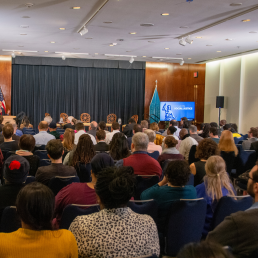
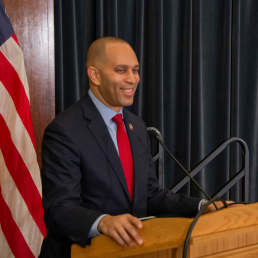
Hollis Wong Wear, a Grammy-nominated singer, songwriter, and producer, presented her perspective as an artist and advocate for other creatives. She voiced the idea that copyright lawyers can learn a great deal from artists and how legal regulations shape their reality, especially with expanded access through social media. She also used the example of Prince and his highly publicized fight against Warner Bros. to gain ownership of his master sound recordings, noting the social and economic impacts of such victories.
Law Professor and Co-Director of the IP Program at George Washington Law, Professor Robert Brauneis reported his findings after conducting research on thirty-five years of registration history. Consistent with the
reports of the previous panelists, Professor Brauneis reported that certain minority groups owned a significantly low number of actual copyright registrations compared to the amount of copyright eligible work they produced. He pointed to the CASE Act as a remedy for this situation, in
addition to the power of copyright attorneys and policy makers to serve creators and educate them on the best tools to benefit from their labor.
